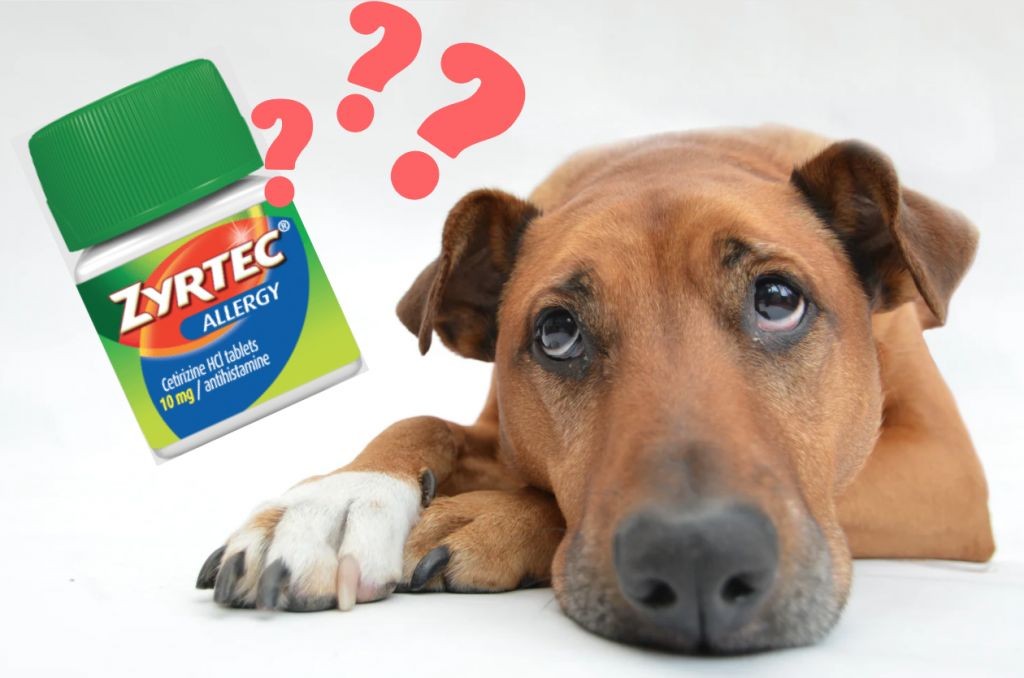Zyrtec for Dogs: Safe Allergy Relief for Your Canine Companion
Discover why Zyrtec may be a vet-recommended choice for managing your dog’s allergies. Learn about its benefits, proper dosing, and safety tips today.
Is your furry friend constantly scratching? Zyrtec, a popular human allergy medication, might be the solution you’re looking for. We’ll explore how this over-the-counter antihistamine can help manage your dog’s allergies and skin conditions.
Veterinarians often recommend Zyrtec for dogs with atopic dermatitis or mild to moderate environmental allergies. It’s particularly effective for pups who scratch excessively, are sensitive to insect bites, or suffer from dermatitis. We’ll investigate into the benefits, proper dosage, and potential side effects of using Zyrtec for dogs, ensuring you have all the information you need to make the best decision for your canine companion’s health and comfort.
What Is Zyrtec and How Does It Work for Dogs?
Zyrtec, an over-the-counter human allergy medication, is sometimes used to manage allergy symptoms in dogs. Its active ingredient, cetirizine, is a second-generation antihistamine that blocks histamine receptors in the body, preventing allergic reactions.
Understanding Antihistamines for Pets
Antihistamines like Zyrtec work by blocking histamine receptors in a dog’s body. Histamine is a chemical released by the immune system when it detects allergens, causing symptoms such as itching, sneezing, and skin reactions. By blocking these receptors, antihistamines prevent histamine from triggering these allergic responses.
Zyrtec is particularly useful for dogs with atopic dermatitis or mild to moderate environmental allergies. It’s often recommended for dogs who scratch excessively, are sensitive to insect bites, or have dermatitis. As a second-generation antihistamine, Zyrtec doesn’t cause drowsiness, and dogs don’t develop a tolerance to its active ingredient with long-term use.
When considering antihistamines for pets, it’s crucial to understand that their effectiveness can vary. The response to antihistamines in dogs with canine atopic dermatitis is often individualized and unpredictable. This means that while Zyrtec might work well for one dog, it may not be as effective for another.
It’s important to note that Zyrtec should only be used under veterinary guidance. While it’s generally safe for dogs, certain factors such as age, weight, and breed can affect the appropriate dosage. Also, dogs with kidney or liver problems may require special consideration, as the medication can stay in their system longer than in healthy dogs.
Benefits of Using Zyrtec for Dogs
Zyrtec offers several advantages for dogs suffering from allergies and skin conditions. This second-generation antihistamine provides effective relief with fewer side effects compared to older medications.
Common Allergic Conditions Treated
Zyrtec effectively manages various allergic conditions in dogs:
- Atopic dermatitis: Zyrtec alleviates excessive itchiness in 18% of dogs with this condition.
- Seasonal allergies: It helps reduce symptoms like sneezing and watery eyes.
- Insect bites and stings: Zyrtec minimizes local inflammation and allergic reactions to bug bites.
- Food allergies: While not a cure, it can help manage symptoms associated with food sensitivities.
Zyrtec’s active ingredient, cetirizine, blocks histamine receptors, preventing the body’s allergic response to various environmental triggers. This makes it particularly useful for dogs with mild to moderate allergies, offering relief from itching, redness, and other uncomfortable symptoms.
Efficacy in Allergy Symptoms
Zyrtec demonstrates high efficacy in treating allergy symptoms:
- Itchy skin: Significantly reduces scratching and discomfort.
- Watery eyes: Decreases excessive tearing and eye irritation.
- Sneezing: Helps control frequent sneezing caused by allergies.
- Hives: Reduces the occurrence and severity of hive outbreaks.
Studies show that Zyrtec is more efficient than some first-generation antihistamines like diphenhydramine (Benadryl) in managing the body’s immune response and combating allergy symptoms in dogs.
Rapid Onset of Action
Zyrtec provides quick relief for dogs suffering from allergic reactions:
- Fast-acting: Typically starts working within 1-2 hours after administration.
- Sustained relief: Continues to alleviate symptoms throughout the day.
- Consistent effectiveness: Maintains its efficacy with regular use.
This rapid onset of action makes Zyrtec an excellent choice for dogs experiencing sudden allergy flare-ups or acute allergic reactions.
Low Risk of Drowsiness
Unlike first-generation antihistamines, Zyrtec offers benefits with minimal sedative effects:
- Reduced drowsiness: Dogs remain alert and active after taking Zyrtec.
- Improved quality of life: Pets can maintain their normal routines without feeling sluggish.
- Long-term use: Dogs don’t develop tolerance to cetirizine, allowing for extended treatment periods.
The low risk of drowsiness makes Zyrtec a preferred option for many pet owners, especially those with active dogs or working breeds.
Proper Dosage and Administration
Administering Zyrtec to dogs requires careful consideration of dosage and proper administration techniques. The correct dosage ensures optimal effectiveness while minimizing potential side effects.
Factors Affecting Dosage
The appropriate Zyrtec dosage for dogs depends on several factors:
- Body Weight: The standard dosage is 1 mg per kilogram of body weight, administered every 12-24 hours.
- Severity of Symptoms: Dogs with more severe allergies may require higher doses.
- Medical Conditions: Dogs with kidney or liver problems need adjusted dosages.
- Age: Older dogs may metabolize the medication differently.
- Breed: Some breeds may be more sensitive to antihistamines.
Dosage guidelines based on weight:
| Dog’s Weight | Recommended Dosage |
|---|---|
| < 10 lbs | 2.5 mg |
| 10-50 lbs | 10 mg |
| > 50 lbs | Up to 20 mg |
Always consult a veterinarian before starting Zyrtec treatment to determine the most appropriate dosage for your dog’s exact needs.
How to Give Zyrtec to Your Dog
Administering Zyrtec to dogs can be done effectively with these methods:
- Tablet Form:
- Give the tablet directly by placing it at the back of the dog’s throat.
- Hide the tablet in a treat or small amount of food.
2. Liquid Form:
- Use a syringe or dropper to measure the correct dose.
- Administer directly into the dog’s mouth or mix with food.
3. With Food:
- Offer Zyrtec with a small meal to reduce the risk of stomach upset.
4. Consistent Timing:
- Administer at the same time each day for optimal effectiveness.
5. Duration:
- Follow veterinarian’s instructions for treatment duration.
Remember to monitor your dog for any adverse reactions after administering Zyrtec. If you notice any unusual symptoms, contact your veterinarian immediately.

Potential Side Effects and Risks
While Zyrtec is generally safe for dogs, it’s important to be aware of potential side effects and risks. Here’s what pet owners should know about common reactions and when to seek veterinary attention.
Common Side Effects
Zyrtec can cause several side effects in dogs, ranging from mild to more important:
- Drowsiness: Some dogs may become sleepy or lethargic after taking Zyrtec.
- Vomiting and diarrhea: Gastrointestinal upset is a common reaction.
- Excessive salivation: Dogs may drool more than usual.
- Hyperactivity: Paradoxically, some dogs become more active or impulsive.
- Urinary retention: Difficulty urinating can occur in some cases.
- Constipation: Changes in bowel movements are possible.
These side effects are typically mild and often resolve on their own. But, if symptoms persist or worsen, it’s crucial to consult a veterinarian.
When to Consult Your Veterinarian
While Zyrtec is generally well-tolerated, certain situations warrant immediate veterinary attention:
- Allergic reactions: Watch for signs like facial swelling, hives, or difficulty breathing.
- Severe vomiting or diarrhea: Prolonged or intense gastrointestinal symptoms can lead to dehydration.
- Extreme lethargy: If your dog becomes unresponsive or excessively drowsy.
- Changes in appetite: Important decrease in food or water intake.
- Behavioral changes: Unusual aggression, disorientation, or extreme anxiety.
- Tremors or seizures: These are rare but serious side effects.
It’s essential to contact your veterinarian if you notice any of these symptoms or if your dog’s condition doesn’t improve after starting Zyrtec. Always consult with a professional before adjusting dosages or discontinuing the medication.
Safety Considerations and Precautions
When using Zyrtec for dogs, it’s crucial to prioritize safety and follow proper precautions. We’ll explore key considerations to ensure your dog’s well-being while using this medication.
Drug Interactions
Zyrtec may interact with other medications, potentially affecting its efficacy or causing adverse reactions. Common drug interactions include:
- Central nervous system depressants
- Anticholinergic drugs
- Theophylline
- Digoxin
Always inform your veterinarian about any medications, supplements, or herbal products your dog is taking. This includes over-the-counter drugs and natural remedies. Your vet will assess potential interactions and adjust the treatment plan accordingly.
Contraindications
Certain conditions or circumstances may contraindicate the use of Zyrtec in dogs. These include:
- Hypersensitivity to cetirizine or hydroxyzine
- Severe liver disease
- Kidney dysfunction
- Pregnancy or lactation
- History of seizures
Dogs with these conditions may require alternative treatments or closer monitoring. Also, Zyrtec isn’t recommended for use in puppies under 6 months old due to limited safety data. Always consult your veterinarian before administering Zyrtec, especially if your dog has pre-existing health issues or is on other medications.
Alternatives to Zyrtec for Canine Allergies
While Zyrtec is a popular choice for treating canine allergies, several alternatives can be equally effective. These options provide pet owners with a range of choices to address their dog’s exact allergy symptoms and health needs.
Benadryl (Diphenhydramine)
Benadryl is a first-generation antihistamine that’s commonly used to treat allergic reactions in dogs. It’s effective for managing symptoms like:
- Itching
- Hives
- Swelling
- Mild allergic reactions
Benadryl typically causes more drowsiness than Zyrtec, which can be beneficial for dogs experiencing nighttime itching. But, it requires more frequent administration, usually every 8-12 hours.
Claritin (Loratadine)
Claritin is another second-generation antihistamine that’s safe for dogs when used correctly. It’s particularly effective for:
- Seasonal allergies
- Environmental allergies
- Skin irritations
When choosing Claritin for dogs, it’s crucial to select a formulation without decongestants, as these can be harmful to canines. Some dogs may respond better to Claritin than Zyrtec, making it a valuable alternative.
Apoquel (Oclacitinib)
Apoquel is a non-steroidal medication specifically designed for dogs with allergic skin conditions. It’s highly effective for:
- Controlling itching
- Reducing inflammation
- Managing atopic dermatitis
Unlike antihistamines, Apoquel works by targeting exact pathways in the immune system responsible for itching and inflammation. It typically provides rapid relief, often within 4 hours of administration.
Atopica (Cyclosporine)
Atopica is an immunosuppressant medication used to treat chronic allergic skin conditions in dogs. It’s particularly beneficial for:
- Long-term management of atopic dermatitis
- Controlling severe allergic reactions
- Dogs who don’t respond well to antihistamines
Atopica works by suppressing the immune response that causes allergic symptoms, providing relief for dogs with persistent allergies.
Hydrocortisone Products
Over-the-counter hydrocortisone products can provide localized relief for dogs with skin irritations. These are useful for:
- Spot-treating itchy areas
- Soothing hot spots
- Temporary relief of mild skin allergies
It’s important to use products specifically formulated for pets and to prevent dogs from licking the treated areas.
Natural Remedies
Some pet owners prefer natural alternatives to manage their dog’s allergies. These options include:
- Omega-3 fatty acid supplements
- Coconut oil (applied topically or given orally)
- Oatmeal baths for skin irritations
- Quercetin (a natural antihistamine found in fruits and vegetables)
While these natural remedies can be helpful, it’s essential to consult with a veterinarian before starting any new treatment regimen.
When considering alternatives to Zyrtec for canine allergies, it’s crucial to work closely with a veterinarian. They can help determine the most appropriate treatment based on the dog’s exact symptoms, overall health, and potential drug interactions. Each dog may respond differently to various treatments, so finding the right solution may require some trial and error.
Conclusion
Zyrtec can be a valuable tool for managing allergies in dogs when used correctly. We’ve explored its benefits dosage considerations and potential side effects. Remember it’s crucial to consult your veterinarian before starting any new medication regimen for your furry friend. They’ll help determine if Zyrtec is the right choice and guide you on proper usage. With the right approach Zyrtec can significantly improve your dog’s quality of life by alleviating allergy symptoms and keeping them comfortable year-round.


